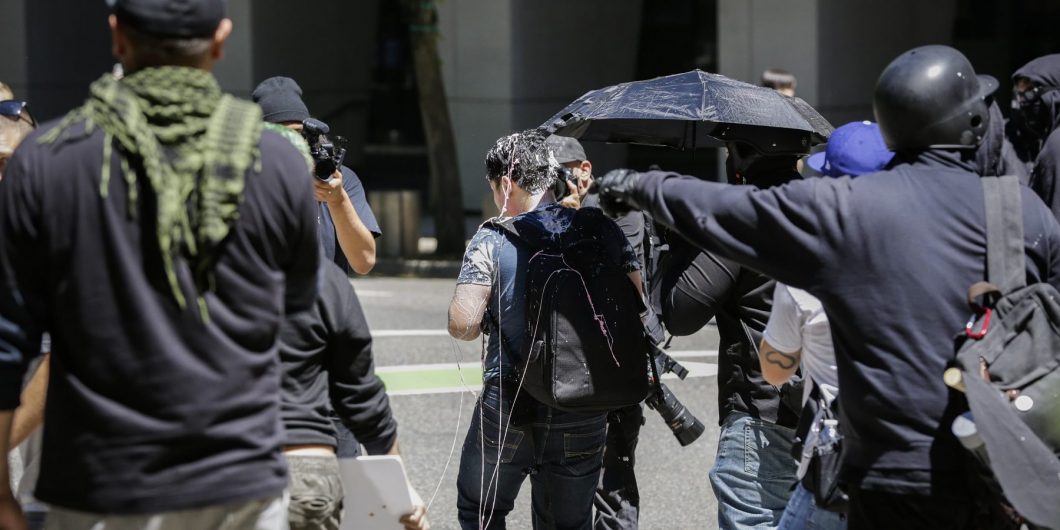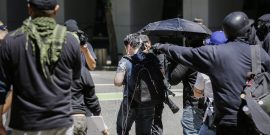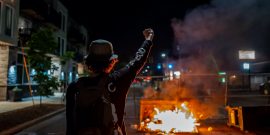The very ideologues who claim that we must be kind are not inclined to be kind to their political opponents—for with them, compassion is merely rhetorical.
Andy Ngo Unmasks the Real Threat to American Freedom
Whether or not Donald Trump’s January 6 address to his supporters rose to the level of criminal incitement under the Supreme Court’s perhaps excessively liberal Brandenburg standard, it was undeniably a thoroughly reprehensible act, or, as Senate Minority Leader Mitch McConnell put it following the impeachment trial, “a disgraceful, disgraceful dereliction of duty.” Nothing can excuse it.
But while news media have every right and reason to condemn Trump’s behavior in provoking a mob (despite his admonition that they should act “peaceably”) to engage in a violent assault that resulted in five deaths (and might have cost more, had it not been for the courageous acts of the understaffed Capitol Police), it is unfortunate that few have placed Trump’s act in a broader context that would acknowledge the threats to our Constitutional order arising from elsewhere on the political spectrum. Starting with the election of 2000, prominent Democrats have questioned the legitimacy of every election in which a Republican won the Presidency—indeed, devoting a majority of Trump’s term to trying him to remove him, on grounds far more spurious than those on which his post-Presidential impeachment rested.
More recently, a thoroughly anti-constitutional precedent was set by then-minority leader Chuck Schumer only last March, when he led a posse of about 75 members up the steps of the Supreme Court to warn recently appointed justices Neil Gorsuch and Brett Kavanaugh that they had “released the whirlwind,” would “pay a price,” and would “not know what hit” them if they voted the “wrong” way on an abortion case. (Schumer’s act won a rare rebuke from the normally reserved Chief Justice Roberts, who denounced Schumer’s comments as “inappropriate” and “dangerous,” stressing, that “all members of the court will continue to do their job, without fear or favor, from whatever quarter.” In a proto-Trumpian response, Schumer spokesman Justin Goodman explained that his boss’s words didn’t mean what they sounded like, and denied that. Schumer was threatening or encouraging violence.)
A decade ago, an even more direct and threatening, though ultimately (mostly) nonviolent, challenge to constitutional government was offered by Wisconsin public employee unions who invaded that state’s Capitol to protest and attempt to block Governor Scott Walker’s program of reforming public-employee contracts so as to balance the state budget without raising taxes, and also liberate public school administrations from rigid tenure rules (closely paralleled in school districts throughout the country) that prevented them from hiring teachers based on merit and adjusting their pay based on performance. Walker’s reforms even went so far as to require public employees to contribute to their health-insurance and pension costs—while still paying less for those benefits than the average Wisconsin citizen. (See Walker’s retrospective view of the “Capitol Siege,” with over 100,000 occupying the building and its surrounding square). Although nobody died in the Wisconsin protests, several legislators, both Republicans and Democrats, reported receiving death threats at the time. And one woman who emailed death threats to Republican lawmakers also pleaded guilty to making a bomb threat. Yet it would be difficult to find criticism of either Schumer’s warnings or the Wisconsin unions’ attempt to intimidate their state’s public institutions in most of the “mainstream” media.
The threat to the rule of law, and even to the constitutionally protected freedom of speech, in today’s America goes well beyond the attack on the U.S. Capitol, let alone the other attempts to intimidate lawgivers and judges just mentioned. The wave of riots, violent crime, and looting ostensibly provoked by George Floyd’s death while police attempted to restrain him is of course well known. But as independent journalist Andy Ngo documents in his just-published book Unmasked, widespread rioting led by the loosely organized anarchist group Antifa began in his home city of Portland several years before the Floyd event. With considerable courage, Ngo both reported on and photographed the months of rioting in Portland and Seattle, entailing direct assaults on police departments and courts in both cities, attacks on police resulting in hundreds of injuries, and multiple deaths. Yet in each case local authorities let most of the violence go unpunished, with Seattle’s mayor Jenny Durkan even celebrating the establishment last June of the “Capitol Hill Autonomous Zone” (CHAZ), from which police and other government personnel were excluded, as exemplifying a “Summer of Love”—until mounting deaths and other casualties, to say nothing of costly damage to local shops, finally caused her to shut it down after three weeks.
The fact of the riots in Portland and Seattle, as well as in many other cities, has of course been widely reported. Its real cause, however, is another matter. Repeatedly, news commentators and columnists have denied the very existence of Antifa as an entity, or at least its responsibility for any criminal actions. (See recent essays by Tarisai Ngangura or Mark Bray, for example.) And everyone from public officials to professional sports stars to Hollywood celebrities to the owners of sports teams has adopted the banner of Black Lives Matter, mistaking a slogan (in lower-case letters) with which no sane person can disagree, with an explicitly Communist-directed organization (as its website affirms), as if joining its leaders in wishing to bring about the violent overthrow of American democracy. The degree to which the celebrities’ endorsement of the BLM movement is the consequence of sheer ignorance, fear, or the pursuit of gain is a judgment that would have to be rendered on an individual basis.
It is a sign of our changing political times that Andy Ngo, who describes himself as gay, an unbeliever, and (at least in the past), a Democrat, should find his chief defenders among those who identify as conservatives.
But the most troubling aspect of the Ngo story is not the fact that he suffered severe beatings at the hands of mobs whose activities he was attempting to film and report (unsuccessfully trying to disguise himself), which landed him in the hospital. It is rather that bookstores, starting with Powell’s (the best-known independent bookseller not only in Portland but probably in the entire U.S.) have been intimidated by Antifa into not even stocking the book.
Although Unmasked reached no. 1 status on Amazon in advance of its release, when Antifa members protested Powell’s plan to sell the book, the store’s managers immediately apologized, explaining that while a lot of the store’s inventory was hand-picked, that wasn’t true of Ngo’s book. They consequently pledged that the book “will not be placed on our shelves. We will not promote it.” They did add that Unmasked would “remain in our online catalog,” since “we carry a lot of books we find abhorrent, as well as those that we treasure.” One might think that they were speaking of Mein Kampf! But despite the pledge that Powell’s wouldn’t stock the book, a crowd of protestors gathered outside the store’s flagship, downtown location (as reported by ABC News) on the day of the announcement, plastering the windows with signs and prompting the store to close early as a safety precaution.
A conversation with a friend and former student of mine who owns another of America’s leading independent bookstores, situated in a fashionable downtown neighborhood far removed from Portland, assures me that Powell’s really had no choice in the matter. In fact, my friend, who is of a moderately conservative inclination, told me that he wouldn’t dare stock the book himself, as the result might be the burning down of his establishment. If he won’t, I doubt that many bookstores, outside of the most conservative areas of the country, would dare to.
It is a sign of our changing political times that Andy Ngo, who describes himself as gay, an unbeliever, and (at least in the past), a Democrat, should find his chief defenders among those who identify as conservatives. But as the son of Vietnamese boat people who risked death to escape Communist prison camps, he evidently appreciates the value of law-based freedom more deeply than many native-born Americans who take it for granted. And most American conservatives, one hopes, have come to recognize that what they share with fighters for freedom like Ngo matters far more than any disagreements about sexual orientation, religion, or party affiliation. But what would John Milton or John Peter Zenger, Thomas Jefferson or John Stuart Mill say of a situation in which a nation that historically prides itself on an unsurpassed freedom of speech and of the press allows anarchist groups to prevent books that express views contrary to their own from being sold? And why are the mainstream media, both print and electronic, making so little of it?
Of course, it is now well known that leading social media used their power to steer public opinion in what Time magazine recently described as a “conspiracy” to ensure that Joe Biden would win the election—for instance, by suppressing the New York Post’s story on the damning information on corruption, possibly involving his father, discovered on Hunter Biden’s laptop. But should they not at least have the sense, if not of principle, then of enlightened self-interest, to appreciate, publicize, and take a firm stand against, the endeavor of violent gangs to stamp out the honest reporting of events that severely threaten America’s well-being?
Donald Trump’s crazed followers, reprehensible though their attack on our nation’s seat of government was, never posed a threat to our Constitutional order. Yet a recent story in the New York Times, based on an interview with an obscure “writer and public scholar of religion and racial hatred,” features only a capsule history of how (according to the scholar) “white Protestant Christianity and nationalism have long been interwoven – even a mainstream movement” in America, “and how many white churches today have yet to reckon with white supremacy.” The story makes no reference to the violence and intolerance of Antifa or Black Lives Matter (neither of which have any connection to the Christian, or any other, religion), let alone alluding to such past, non-white inciters of violence and murder as Stokely Carmichael, Malcolm X, Louis Farrakhan, or (once again a darling of leading Democratic politicians) the Rev. Al Sharpton. The story even blames American churches (with no evidence being supplied) for ostensible involvement in the January 6 attack.
Meanwhile, Times contributor Sarah Jeong, who made headlines in 2018 for her history of sometimes obscene tweets denouncing white people as a class, has branded Ngo as “dangerous” and recently called for his censorship on Twitter. And in an interview with the leftist Southern Poverty Law Center, Yale philosophy professor Jason Stanley denounced Ngo for promoting a “false equivalence” between left- and right- wing political violence in the U.S. But it was Ngo, not Jeong, that received so many death threats from Antifa that he decamped to London.
Whatever noises he may make, and however outrageous his behavior out of office, Donald Trump will pose no danger to the preservation of our constitutional liberties and the rule of law. If those principles are threatened today, it’s because of the spinelessness of civic authorities who fear to defend the them, and think that the proper response to riots is to “defund the police.” One is tempted to recall Robert Frost’s definition of a liberal as “a man too broadminded to take his own side in a quarrel.” But in this instance, Andy Ngo’s side should be recognized as the cause of all decent Americans. Whether liberal or conservative, we need to stand by him, and the principles he represents.



